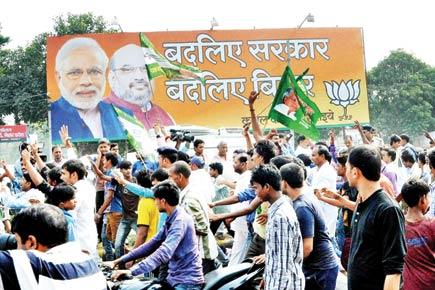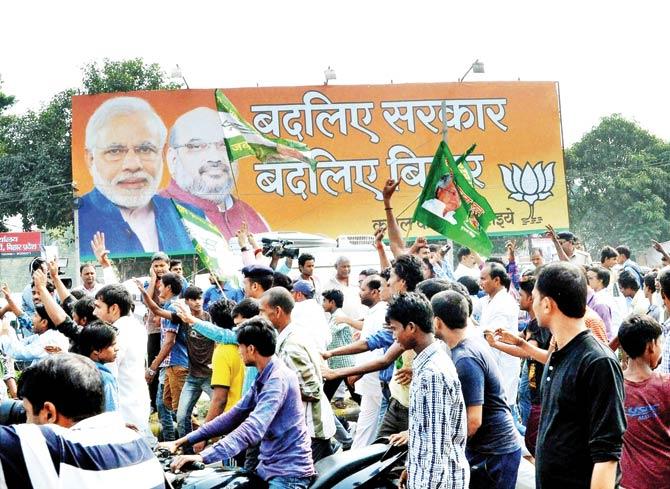Elections in India are always wondrous things. Almost everyone comes a cropper predicting outcomes

 Elections in India are always wondrous things. Almost everyone comes a cropper predicting outcomes. But there are some underlying lessons that no one, especially a politician, should ever forget. The first among these is that the Indian voter has an infinite capacity to surprise.
Elections in India are always wondrous things. Almost everyone comes a cropper predicting outcomes. But there are some underlying lessons that no one, especially a politician, should ever forget. The first among these is that the Indian voter has an infinite capacity to surprise.
ADVERTISEMENT
Second, and equally important, he/she does not like to be intimidated. For the average Indian, voting is a form of empowerment. Election day is just about the only time he/she gets to tell off politicians who, otherwise, treat them cynically. Anyone who seeks to undermine this feels the voters’ wrath. Indira Gandhi learnt it the hard way when she lost every seat in Uttar Pradesh and Bihar in 1977. Through some osmotic communication, electors decided that the Congress party’s tyranny was simply not acceptable. Something similar seems to have happened in Bihar, where within the space of a year, the National Democratic Alliance strategy of frightening the voter with a barely concealed anti-Muslim message has spooked the voter.

JD(U) supporters in Patna walk past a BJP hoarding as they celebrate the Mahagathbandhan’s victory in the Bihar Assembly polls on Sunday. Pic/PTI
The electorate has very clearly told the BJP that they had elected the Modi government not to bring some version of Hindutva Raj, but to bring economic and governance changes that would enhance the quality of their economic and personal lives.
A subtext of the outcome is that the electorate, especially the majority Hindus, will not accept violent religious extremists of their community disrupting the unity of their country. There were several reports of attempts to fan communal violence in Bihar, with the typical stratagems of throwing body parts of cows and pigs into temple and mosque premises. The target district was Bhagalpur, which had seen horrific communal violence in 1989. But this time around, the people would have none of it — they refused to get provoked.
Hopefully, some of the calmness shown by Biharis when confronted with efforts at communal provocation will also be visible in Uttar Pradesh. According to Home Ministry figures, there has been a sharp uptick in communal violence across the country in the first six months of this year. 68 of the 330 incidents were in UP and 41 in Bihar, and it does not take a genius to figure out just why this is happening. The 2013 communal violence in Muzaffarnagar brought out the manner in which the BJP and its fellow Parivar — the Bajrang Dal, Vishwaa Hindu Parishad and RSS — successfully used a combination of tactics to deepen Hindu-Muslim friction to polarise the electorate.
The very obvious consequence of the Bihar outcome is that the BJP and the Modi government are at a fork in the road. They can, if they wish, pursue the path they have taken in the past year of trying to deepen divisions in the country, marginalizing minorities and stifling dissent. The RSS has long believed that their best opportunity lies in polarising the Hindu community and thus providing the BJP the massed votes of the overwhelming majority of the country’s population. However, their version of Hinduism is not the Sanatan Dharma as we know it, but a mirror of Pakistani Islam, where some self-appointed mullahs dictate what is kosher, and where violence is used to enforce their diktat (fatwas). Just as Pakistani mullahs are obsessed with India, so, too, are the advocates of Hindutva driven by Pakistan and Pakistanis.
It is not so hard for Modi to find his way because it has been shown earlier by a leader much taller than him — Atal Bihari Vajpayee. Though both were products of the RSS machine, Vajpayee had a much longer period in which to carve out a distinct identity for himself which positioned him very cleverly at a place where the Sangh needed him more than he needed them. And when required, he simply ignored them. Unfortunately for Modi, his temperament is quite different from that of Vajpayee, and this becomes manifest in combative self-obsessed personality and inability to reach out and reassure minorities that he means what he says when he insists that his holy book is the Constitution of India.
He needs to understand that upholding the Constitution is not just some legal compulsion that he has, but also a practical one. Those who drafted the Constitution, which has served us well for 65 years, understood that this continental-sized country with numerous religious and ethno-linguistic divisions could only be kept together through the compact they devised. If the Indian Union is going to be about giving primacy to Hindus, why should states like Arunachal, Mizoram, Meghalaya, Nagaland and Jammu & Kashmir and Punjab remain in it? And why should millions of other Muslims, Sikhs, Buddhists and Christians accept this?
Modi will have to work hard to reclaim his original mandate, which is in danger of being pulled apart by his friends and enemies. This, to repeat, was to bring about transformational changes in the country’s economy and governance. It was to attack corruption, reform ministries and provide the leadership to give the country sustained and high rates of economic growth.
Setbacks are not unusual in politics. But what marks a successful politicians is what he makes of his defeats, rather than how he celebrates his success. This is testing time for Modi, but he alone holds the power to determine how he will fare.
The writer is a Distinguished Fellow, Observer Research Foundation, New Delhi
 Subscribe today by clicking the link and stay updated with the latest news!" Click here!
Subscribe today by clicking the link and stay updated with the latest news!" Click here!






